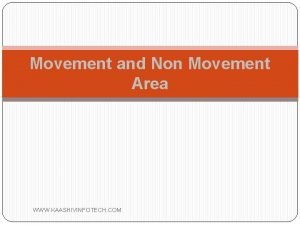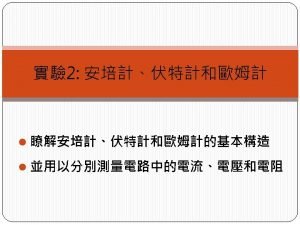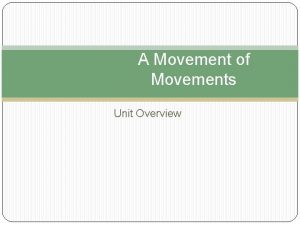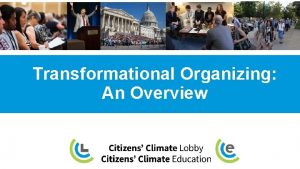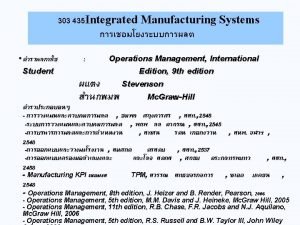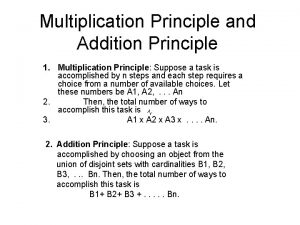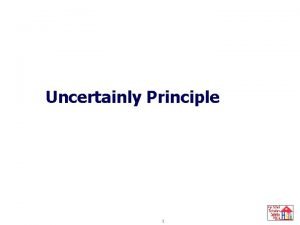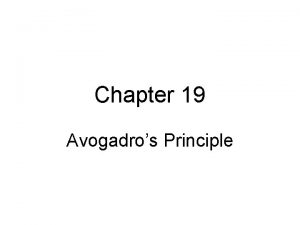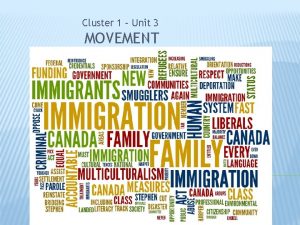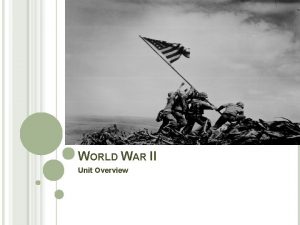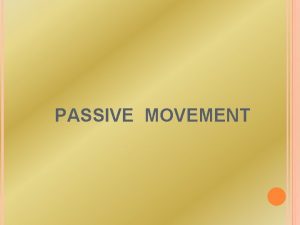Movement of Movements Unit Overview Organizing Principle The

















- Slides: 17

Movement of Movements Unit Overview

Organizing Principle The experience of World War II began to challenge the conventional wisdom regarding race relations in the United States. Following the global conflict, African-Americans created a national conflict by challenging the racial hierarchy that ran directly against the basic principles that the United States was founded on. Black Americans, followed by other minority groups that were excluded from the American dream, fundamentally changed the American narrative by standing up for their rights during the 1950 s through the 1970 s.

The Civil Rights Act of 1964 �Outlawed Jim Crow in public accommodations �Public Facilities �Places of lodging �Restaurants �Places of entertainment �Bathrooms �Employment �Hiring practices (Title VII) � Outlawed segregation by race, national origins, religion and sex �Limiting payment or opportunities

Freedom Summer �The Vote �Mississippi: 5% of eligible blacks could vote �Literacy tests �“Freedom Summer” 1964 � Voter registration drive o Northern students • SNCC, FSM, SDS � Serious backlash � 3 participants killed o Andrew Goodman o James Chaney o Andrew Schwerner � 21 arrested—zero convicted

Civil Rights: A National Issue �The North and West �De Facto Segregation �Custom and practice � Poverty � Housing � Schools � Employment � Police brutality �Paradox �Many northerners supported Southern rights in the South while ignoring racist practices in their own communities. � Proposition 14 (CA) �Gains of nonviolent protest? �Harlem— 1964 � Racial disturbances (civil disorders begin)

The Election of 1964 �Mississippi Freedom Democratic Party (MFDP) �Grassroots organization �Mobilized poor blacks �Disrupted the Democratic Party Primary �Demanded recognition �Candidates �Lyndon Baines Johnson (TX—D) � Supported Civil Rights legislation �Barry Goldwater (AZ—R) � States’ Rights �George Wallace (AL—I) � Pro-segregation �Johnson wins! �Urban reform—Housing and Urban Development (HUD)

Battle for Voting Rights �The Selma March (1965) �SCLC campaign—MLK � Alabama voting drive o March from Selma to Montgomery o State troopers gas and whipped activists o Two killed later � Media spectacle �Johnson calls for legislation �Voting Rights Act (1965) �Outlawed literacy tests �Established federal voting registrars

The Splintering of a Movement �Civil Disorder Spreads (‘ 64 -’ 65) �Newark, Rochester, Chicago, Detroit and Watts �Black Power � Malcolm X (Little) “Ballot or Bullets” Separatist—Nation of Islam Assassinated in 1965 � Stokely Carmichael SNCC leader “Black Power” � Black Panthers (1966) Oakland based black activists Police themselves FBI—COINTELPRO

MLK Assassinated � 04 April 1968 � Memphis, TN � Speaking to striking workers � John Wilkes Booth �Aftermath � Riots breakout nationwide

Limits and Gains of ‘ 68 �The Kerner Commission �Study of the causes of urban violence � Sparked by Watts riot �Calls for elimination of de facto segregation � Housing and jobs �Johnson ignores most recommendations � White resistance � Civil Rights Act of 1968 �“Ends” discrimination in housing �Prohibits discrimination regarding the sale, rental, or financing of houses

Women’s Liberation � Women in the 1960 s � Wage disparity and limited upward mobility o 40% of women work for wages � Participants in protest movement • SNCC and SDS—men controlled � Civil Rights Act of 1964 � National Organization of Women (NOW)— 1966 � Child care facilities � Discrimination in the workforce (EEOC) o Wage disparity o White collar demographics � Protested traditional roles of women �Push for constitutional amendment � Miss America Protest (1968) �Atlantic City, NJ � Objectification � Ms. Magazine (1972) �Feminist publication � Gloria Steinem

Chicano Movement �Mexican-Americans �The United Farm Workers �César Chávez � Leads hunger strike and boycott over working and living conditions (1968) �La Raza Unida � Political party in Texas �Puerto Ricans �Young Lords (NY) �Similar to the Black Panthers �Legacy �Political participation

Red Power! � American Indian Movement (AIM) �Native rights—national agenda �Tribal origins � Actions �Alcatraz (1969) � Native occupy island � 18 month siege �Bureau of Indian Affairs (1972) � 6 day occupation �Wounded Knee (1973) � Armed standoff in SD � Legacy �Reforms in Indian policy �Revival of tribalism

Feminism—Rethinking Gender � Victories �Title IX (1972 Education Act) � Prohibits sex discrimination in federally assisted educational program or activity � Women’s athletics �Equal Rights Amendment (ERA) 1972 � Early support � Won congressional approval o 28 states ratify �Supreme Court � Roe v. Wade �No fault divorce laws � Defeats �Backlash � Nixon—strikes down nationwide public daycare � Rising divorce rate � Pro-lifers �ERA eventually fails � Phyllis Schlafly—social conservative

Gay Liberation �Discrimination �Laws �Homosexuality treated as a disease �Social pressures �Discrimination in hiring �Job loss �Stonewall Inn Rebellion (1969) �Greenwich Village, NYC �Police sting goes awry—violence breaks out

Affirmative Action & Desegregation �Philadelphia Plan—groups over individuals �“set-asides” for minority sub-contractors (quotas) �Griggs v. Duke Power Co. (1971) �Prohibited tests �Encouraged hiring and admission of minorities �Academics �White reaction �“Reverse discrimination!” �Busing �Swann v Charlotte –Mecklenburg (1971) �Upholds forced busing to desegregate �South Boston bus protests

Mixed Legacies � Civil Rights �Race pride �Integration �Political participation � Voting rights and holding office � “New Left” �Student Movement failed—but participatory democracy increases � Women’s Liberation � Reproductive rights � Access to jobs � Pay scale � Holding office � Gay Liberation � Abolishment of open discrimination � Backlash?
 Locomotor dance definition
Locomotor dance definition Searching for an organizing principle
Searching for an organizing principle Movement vs non movement area
Movement vs non movement area What is informal email
What is informal email Unit 10, unit 10 review tests, unit 10 general test
Unit 10, unit 10 review tests, unit 10 general test Principles of design radial balance
Principles of design radial balance Elements of art accordion book
Elements of art accordion book D arsonval movement
D arsonval movement Hình ảnh bộ gõ cơ thể búng tay
Hình ảnh bộ gõ cơ thể búng tay Lp html
Lp html Bổ thể
Bổ thể Tỉ lệ cơ thể trẻ em
Tỉ lệ cơ thể trẻ em Chó sói
Chó sói Tư thế worms-breton
Tư thế worms-breton Hát lên người ơi alleluia
Hát lên người ơi alleluia Kể tên các môn thể thao
Kể tên các môn thể thao Thế nào là hệ số cao nhất
Thế nào là hệ số cao nhất Các châu lục và đại dương trên thế giới
Các châu lục và đại dương trên thế giới


